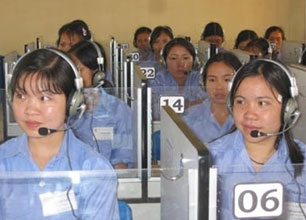Vietnam targets to send 85,000 labourers abroad in 2010
According to the Ministry of Labour, War-Invalids and Social Affairs (MOLISA), in 2010, the labour export market will see signs of recovery as there will be gradual increase in employment of labourers.
As of December 2009, the country sent nearly 75,000 labourers abroad to work, accounting for 83% of the target.
Nguyen Thanh Hoa, MOLISA Deputy Minister, said the target was not realized mainly due to objective reasons such as the world economic crisis and domestic economic downturn. In addition, some labourers did not meet employers’ requirements.
Reporter: What do you think about labour export in 2010? Which market will be Vietnam’s promising market?

Labourers study foreign languages before being sent to work abroad.
Mr. Hoa: In 2010, according to experts’ assessments, positive signs will be seen in the world economic situation. In Vietnam, growth rate is forecast to be higher compared to 2009. Therefore, labour export markets will also see promising signs. The country will focus labour export on the Japanese and Korean markets, and increase labour export to Malaysia. In particular, the Middle East is a potential market which is suitable for Vietnamese labourers.Reporter: Which measures should be carried out to protect labourers’ interests?
Mr. Hoa: We have 20 years experience of sending labourers abroad to work. Our legal system is increasingly developing to protect labourers’ interests, especially the law on sending labourers to work abroad which was adopted by the National Assembly.
The law system regarding the issue is relatively sufficient. Implementing the law successfully means protecting labourers’ interests. In addition, enterprises have become more responsible for protecting the interest of laboures, while authorized agencies will increase inspection of the implementation of law in enterprises and labourers’ awareness on their responsibilities and interests.
In terms of State management, the Prime Minister has agreed to set up some more overseas labourers management boards. I think that these measures will contribute to the increased management and protection of labourers’ legitimate interests.
Reporter: What policies do the State have to support labour export, especially for labourers in 62 poor districts?
Mr. Hoa: The State has comprehensive policies to support poor labourers to work abroad.
In 2009, a project was submitted to the Government to help boost labour export in 62 poor districts. Six months after the implementation of the project, in late 2009, 1,000 labourers in poor districts were sent to work abroad. The target is to increase this number by 5,000 poor labourers this year.
This was the first time we implemented a labour export project in the most disadvantaged regions of the country that mainly targeted ethnic minorities in remote and mountainous areas. Despite a lot of difficulties, after six months, we believe that this year’s target will be realized, thus helping poor labourers escape poverty.
Reporter: Does MOLISA have any measures to help enterprises increase the quality of labourers?
Mr. Hoa: Over the past years, MOLISA has had many programs to help enterprises train and increase the quality of labourers, including a program to fund enterprises to train labourers in different areas. In 2010, the ministry will continue the program, and train overseas labourer management officials for enterprises.
Reporter: Thank you very much.
There are currently nearly 450,000 labourers working in 40 countries and territories
Each year, Vietnamese labourers in foreign countries send from USD 1.6-2 billion to their relatives in Vietnam.
In 2009, Vietnam brought 75,000 labourers abroad and targets to send 85,000 labourers in 2010.
From 2010, Vietnam strives to train 70-80% of the number of labourers sent to work abroad.
(VOV)

